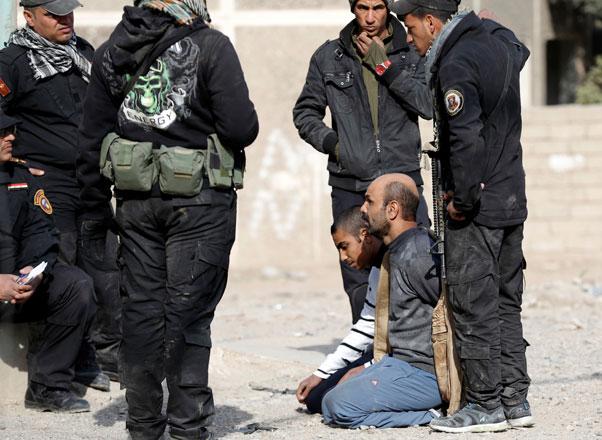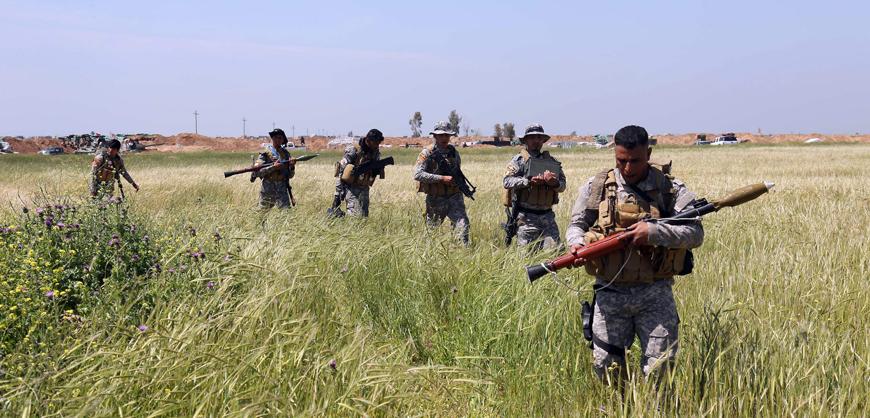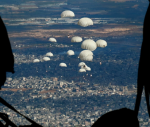You are here
Iraqi forces grind on in east Mosul as political rift opens over Shiite militias
By Reuters - Nov 27,2016 - Last updated at Nov 27,2016

Members of an Iraqi special forces intelligence team talk to suspected Daesh militants in Mosul, Iraq, on Sunday (Reuters photo)
MOSUL — Iraq's sectarian political leaders have plunged back into a dispute over the status of Shiite armed groups, undermining efforts to reunite the country as its troops press on with the assault of Mosul, the Daesh terror group's biggest stronghold.
Forty days into the biggest ground offensive in Iraq since the US-led invasion of 2003, about a quarter of the city has been taken by US-backed government units on the eastern side. The western part could prove far more dangerous, Major General Najm Al Jubbouri, one of the army's top commanders, told Reuters.
Residents still wearing the long beards demanded by Daesh welcomed Iraqi troops into a neighbourhood of east Mosul with coffee, cheers and kisses after the fighters left.
"Today we have been released from prison," said a resident, Ahmed Zeidan Mahmoud. "We were imprisoned. No water, no electricity, there was nothing."
On the wall of a kindergarten, the faces of two girls were blotted out by militants who consider it un-Islamic to depict people. Nearby, a dog was eating the corpse of a militant.
The slow progress was overshadowed by the sectarian political quarrel that erupted in Baghdad on Saturday when Shiite lawmakers forced a law through parliament legalising the mainly Iranian-backed paramilitary units known as Popular Mobilisation forces.
Many Sunnis consider the paramilitaries to be sectarian militia and accuse them of having carried out abuses in Sunni areas recaptured from Daesh. The Popular Mobilisation units deny having sectarian aims or committing widespread abuse and say they saved the nation when the army crumbled in the face of Daesh’s lightning advance two years ago.
Sunni members of parliament boycotted the session held on Saturday, objecting to the existence of armed groups outside the army and the police, and worrying that Popular Mobilisation will enhance Shiite majority rule and Iran’s regional influence.
The dispute threatens to complicate efforts to pull the country back together and foster reconciliation when Mosul is captured, which would mark the effective defeat of Daesh in Iraq.
The Iraqi military estimates there are 5,000 to 6,000 insurgents in Mosul facing a 100,000-strong force made up of Iraqi government troops, Kurdish peshmerga fighters and Shiite Popular Mobilisation units.
Many difficulties
The law voted on on Saturday would turn the Popular Mobilisation units into a separate military corps, reporting to the prime minister. Under Iraq’s political system that splits top jobs between different communities, the prime minister is a member of the Shiite majority.
Sunni lawmakers plan to challenge the law in the federal court, one of them, Raad Al Dahlaki, told Reuters on Sunday.
Official status for the Shiite fighters could feed into the narrative of fear and resentment among Sunnis that helped Daesh militants sweep to power in areas covering a third of Iraq in 2014.
After taking Mosul, the largest city in the north, the fighters declared a “caliphate” that also spans part of Syria. The group considers all Shiite Muslims to be heretics who must repent or die. But its violent rule has also antagonised Sunnis, raising hope for reconciliation among Iraq’s sects after the group is defeated.
“It won’t be rosy. Many difficulties,” said Major General Al Jubbouri, who is himself a Sunni, commenting on the sectarian system established post-Saddam Hussein.
“Some politicians will not like to change because many of them would lose their positions,” he said.
Daesh militants in Mosul are dug in among more than a million civilians as a tactic to hamper air strikes. They are resisting the advancing troops with suicide car bombs and sniper and mortar fire.
“If there weren’t civilians we’d be able to advance to the 4th bridge,” in southern Mosul, said Brig. Gen. Mustafa Sabah from the 9th armoured division that is attacking from the south east.
He was referring to one of the strategic bridges across the Tigris River that splits Mosul west from east. US strikes have hit four of the five bridges militants have been using to cross between the two halves of the city.
Iraq forces pushed deeper into eastern Mosul over the weekend, clearing out a residential apartment complex where residents welcomed them. The militants finally left after positioning themselves on the rooftops of three-storey apartment blocks.
One resident said the militants had tried to scare local people by telling them the army would rape their women.
In some parts of east Mosul there are signs of heavy fighting during the liberation but others are not damaged suggesting militants may have retreated.
Daesh leader Abu Bakr Al Baghdadi, believed to be somewhere near the Syrian border, has told his fighters there can be no retreat from the city.
Mohammed Ahmed, an 18 year-old resident in Mosul’s Khadra district, said he heard one Daesh militant shouting: “The angels are fighting with us. The angels are fighting with us.”
Related Articles
BARTELLA, Iraq — Iraqi special forces battling to clear the Daesh terror group from eastern Mosul have killed nearly 1,000 militants, but fi
ERBIL/BAGHDAD, Iraq — An Iraqi army offensive touted as the first phase of a campaign to recapture the northern city of Mosul from the Daesh
BAGHDAD — The United Nations said on Tuesday it is "racing against the clock" to prepare emergency aid for hundreds of thousands of civilian


















